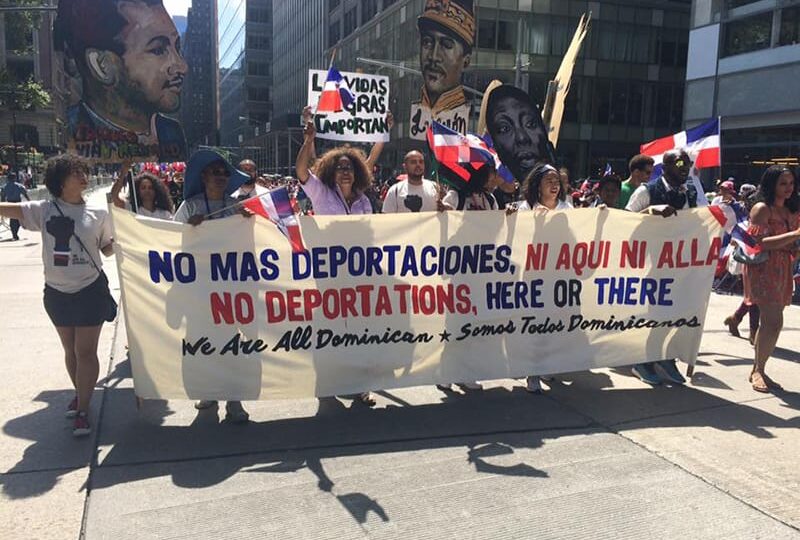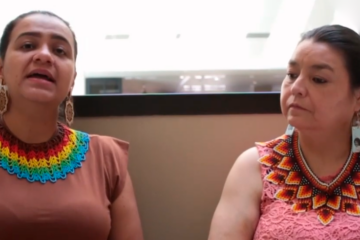Elena Lora is a Black Dominican woman of Haitian descent. A social worker, she is co-founder of Movimiento Reconocido (literally “Recognized”), a grassroots organization advocating for independent citizenship rights, formed mainly by young people. “Reconocido’s work is to claim and fight for the rights of Afro-descendant people born in Dominican territory, whose fundamental, civil, and political rights have been violated. We work on the issue of self-recognition in the face of the violation of the rights of those of us who were born here in the Dominican Republic,” Elena explains.
Reconocido initially emerged as a campaign to denounce rights violations and is considered a continuation of the activist work of leader Sonia Pierre, who passed away in 2011, the same year the organization was founded: “We emerged to continue the struggle she carried during her lifetime.”
Reconocido is present across most of the country, especially in batey zones — settlements built around sugarcane production — “since most of us in this situation are daughters and sons of Haitian mothers and fathers, and historically the Dominican Republic maintained a bilateral agreement between States to bring Haitian cane cutters (braceros) beginning at the end of the 19th century. Up until 1997, it was still common practice for Haitians to come and work as cane cutters,” Elena recounts. She continues: “As a consequence of that migration, we — the children of those migrants — were born.”
What is sold through tourism is the image of the Dominican Republic’s development. However, within it, at its core, there exists an entire policy of discrimination based on racial origins, skin color, and surnames

How is women’s participation within the organization?
Reconocido is mixed, but its leaders are primarily women. We are represented in the national coordination, where the board is made up of three women. The local coordinations are also composed of women. In other words, women have a strong leadership voice in the communities where we work. We believe this is important, since denationalization policies are deeply tied to gender issues.
If a Haitian migrant woman or descendant without documentation has a child with a Dominican man, even if the man has documentation, the child cannot be registered because the woman is the one who must have the documents. In this sense, situations become even more serious when it is women who face the reality of denationalization, which then, like a chain, affects their children.
Currently, there are more than 200,000 people considered stateless, but there is no disaggregated data on how many are men or women. A comparative study, based on the national immigrant survey, states that there are 277,000 people of Haitian descent in the country, but again, without disaggregated gender data.
Faced with current deportation and insecurity policies, how do you perceive the role of conservative forces? Are there ongoing anti-immigrant campaigns?
In the movement, we are people born in the Dominican Republic, and the vast majority of us have never been to Haiti. We do not even speak Creole. In that sense, our struggle is for nationality and recognition of the right to be born Dominican for those of Haitian descent. We are the consequence of Haitian migration to the Dominican Republic. Nor are we exempt from all the current migration policies being implemented in the country.
There are groups that call themselves “civil society,” but in reality they are fueled by the same conservative elite forces. Previously, there was a political party called the National Progressive Force, which always maintained discourse against migration. Today, groups such as Antigua Orden Dominicana (literally “Old Dominican Order”) have arisen. In the past four years, current president Luis Abinader has taken migration more explicitly as a state agenda, from the executive power, implementing measures that reinforce violence against people’s rights, especially women’s.
As a human rights organization, we denounce all of these discriminations and structural racist policies, which also put our lives at risk as young people born in the country. For women, when it comes to health and sexual and reproductive health, there is the issue of obstetric violence, which has been normalized. In health centers, Black and Afro-descendant women are detained and taken away shortly after undergoing cesarean sections. Their dignity is violated. The migration crisis is global, but in the Dominican Republic we are experiencing particularly acute situations with the Haitian migrant population. Haiti’s reality is a historical, structural, and humanitarian crisis.
How do you see expressions of racism in the Dominican Republic today?
It manifests in the media, in school textbooks, and in the country’s laws. The infamous Sentence 168-13 — the one that stripped more than 200,000 people of nationality — is based on institutional racism. This institutional and structural discrimination has been present since the 1937 massacre, when dictator Rafael Leónidas Trujillo initiated anti-Haitianism policies.
In addition, the language used by the media and by paramilitary groups that have risen against Haitian migrants and their descendants shows us that racism is structural and has grown stronger. It does not come only from the State, but also from institutions, communication outlets, and communities. Haitians are seen as a burden, as a plague, as invaders. Racism has intensified, fueling hate speech.
Currently, the migration policy put forth by President Luis Abinader also poses risks for Dominicans of Haitian descent, since it is based on racial profiling. A Black woman without documentation is deported, detained, or expelled to a country she does not know, by migration officers or other forces currently authorized to do so.
One recent example: in June, immigration authorities raided a woman’s home looking for migrants and expelled her, a Dominican born in the country, along with her three children. She was subjected to denationalization. They sent her to Haiti, but she has no family there. Her three children fell ill. Yet for weeks the State remained silent. She is not Haitian, but the State insists that she is. When she arrived in Haiti, she had nowhere to go — no family, no roots, nothing. This is in line with migration policy and racism. Why was she taken? Because she is Black.
In your opinion, what should a policy look like to ensure the right to exist and live with dignity in the country where one was born or has chosen to live? What role do grassroots movements play in building it?
I believe that one solution is to remember that the Dominican Republic is constituted as a social, democratic, and rights-based State. Yet it violates its own constitution. One path forward is for it to acknowledge itself as such and guarantee people’s dignity, regardless of origin, race, or gender.
States must seek more inclusive nationality policies. The Dominican State must fully restore nationality to all Dominicans. With this, we will be able to move forward, to enjoy civil and political rights, and to fully constitute the citizenship that belongs to us. For the Haitian migrant population, the State must guarantee and recognize that being a migrant is not a crime, and that this population — with whom it has a historical debt — has made a significant contribution to the Dominican Republic’s economy.
Instead of spending so much on militarizing border areas — processes that often increase human trafficking and violate migrants’ rights — it is better to create bilateral agreements, develop these areas, and allow migrants in surrounding regions to have opportunities for work.
There must be comprehensive regulation that takes into account workers, their children, and the people who have historically been in the country. The so-called viejitos cañeros (elder cane workers), for example, came, gave their lives, worked, paid into the system, and to this day the State has not granted them a pension for a dignified old age. Many die in poverty and exclusion. Their children also lack rights and live in denationalization and statelessness. The statelessness experienced here in the Dominican Republic is the largest in the Western Hemisphere.
We must push and advocate so that our voices are heard. We must not be silenced, but to continue building from our experience and our work with the population facing violations. Haitian people are people and must not be treated as if they were a plague. They are people who contribute. The Dominican population of Haitian descent is being discriminated against. They are civilly dead, and this must be made public so that people know.




